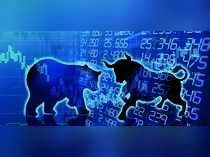 Agencies
AgenciesThe US market’s three main stock indices fell between 1% and 2% on Friday in response to the news of SVB’s collapse and the resilient American jobs market. The weakness could rub off on Dalal Street on Monday morning as foreign investors may step up selling on local stocks in a flight to safer assets. The Sensex and Nifty have fallen over 2% in the past two trading sessions mainly led by domestic banks.
Market participants said the impact of the crisis in Silicon Valley Bank on India seems to be indirect so far. The concerns are more around the impact on sentiment that these events could have on domestic equities, which is already out of investors’ favour for now on account of rich valuations and slowing companies’ earnings.
US Financial regulators on Friday shut down Silicon Valley Bank, an American lender that services start-ups, in what is the largest failure among American banks since the global financial crisis when Lehman Brothers had to wind up. SVB’s collapse has left investors fretting which is the next one.
“The big question is how widespread the angst is,” said ING’s senior rate strategists Antonie Bouvet and Benjamin Schroeder in a note. “The fear is that if one has issues, others might too. Banks are well capitalised, but there can still be notable casualties.”
Wall Street commentators said in the wake of the SVB closure, several small banks that have been below the regulators’ radar remain vulnerable.
SVB’s collapse is a textbook case of Asset-Liability Mismatch—where lenders use short-term hot money to lock-in money long term. The lender accepted billions of dollars during the tech funding boom when interest rates were near zero levels. It then put a portion of those funds into long term bonds on expectations that rates would remain at those levels. As the Fed started increasing rates at the fastest pace in decades, its bond portfolio started incurring losses as prices declined. With depositors fast pulling money out of the bank, it was trapped with several loss-making bonds and few liquid paper. This is reminiscent of what happened to the Indian mutual fund industry soon after the IL&FS crisis when various debt schemes invested short-term money into illiquid papers.
JP Morgan’s analysts said the liquidity concerns are more specific to smaller banks as the larger peers were we
The SVB fiasco is only a distraction from the original issue that is worrying investors: inflation. The US economy added more jobs than expected and the unemployment rate was higher, raising expectations that the Fed might have to increase interest rates by 50 basis points. Till last year, even the most hawkish of the Wall Street money managers anticipated the US Fed’s interest rate increases to end at 5-5.5%. Now, such expectations have been raised even higher to 6%.
That is bad news for emerging markets including India. The question that seasoned market participants are asking is why would a foreign investor earning 6% in the world’s safest financial instrument look at expensively-valued stocks in India.
That said, the fallout of a prolonged period of higher interest rates may unfold across developed markets in the coming months. Investors will watch the structured deal space in the US private market especially by Private Equity and hedge funds even more closely to assess the stress in the financial system. In an interview with ET in December, Rupal J. Bhansali, CIO and portfolio manager-Global Equities, of US-based Ariel Investments highlighted the risk of debt-driven Private Equity transactions. If there is withdrawal of money from that asset class, a version of 'taper tantrum' could occur in private equity, said Bhansali. That could create a feedback loop into public equities and the bond market. In short, the excesses of the private market could have just started unravelling with the SVB episode.
(What's moving Sensex and Nifty Track latest market news, stock tips, Budget 2024 and expert advice, on ETMarkets. Also, ETMarkets.com is now on Telegram. For fastest news alerts on financial markets, investment strategies and stocks alerts, subscribe to our Telegram feeds .)
Subscribe to The Economic Times Prime and read the Economic Times ePaper Online.and Sensex Today.
Top Trending Stocks: SBI Share Price, Axis Bank Share Price, HDFC Bank Share Price, Infosys Share Price, Wipro Share Price, NTPC Share Price
Read More News on
(What's moving Sensex and Nifty Track latest market news, stock tips, Budget 2024 and expert advice, on ETMarkets. Also, ETMarkets.com is now on Telegram. For fastest news alerts on financial markets, investment strategies and stocks alerts, subscribe to our Telegram feeds .)
Subscribe to The Economic Times Prime and read the Economic Times ePaper Online.and Sensex Today.
Top Trending Stocks: SBI Share Price, Axis Bank Share Price, HDFC Bank Share Price, Infosys Share Price, Wipro Share Price, NTPC Share Price










 Get Unlimited Access to The Economic Times
Get Unlimited Access to The Economic Times
